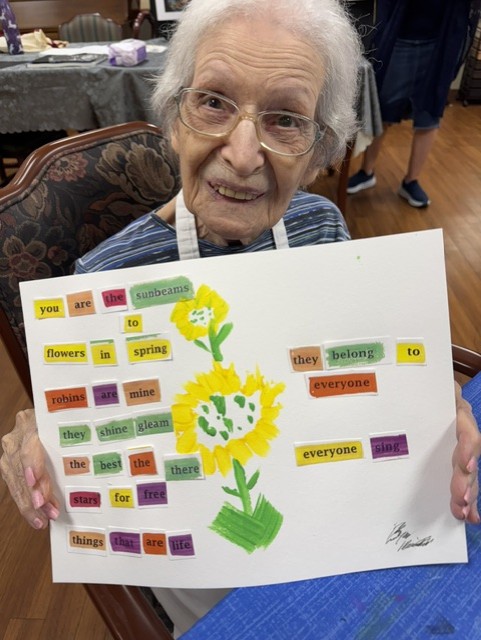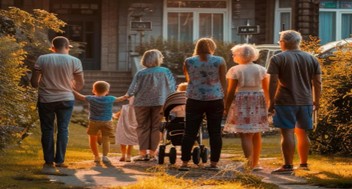“We learn our religion through music earlier than we learn it through reading texts. … In his Jewish upbringing, Peter recalled, ‘I learned the Kaddish … long before I knew their purpose specifically and what the words meant. Anyone who hears the notes of the traditional form of that prayer has an immediate emotional response to it: four notes of the Kaddish, and anyone with familiarity will be put in that state of awareness.”[1]– Jane Redmont
The meaning of a song is mysterious, holding memory of moments in life long past. A song connects the listener with experiences of life: of love, loss, friendship, community and treasured, specific events.
As I have gotten to know and minister among aging populations and people with dementia, I have learned the true meaning of music, singing and listening with each other. Making music brought life into my ministry and helped the community of residents with dementia at Fairhaven Community, where I have served this season, become more connected in our life together with each other, and to experience the presence of the sacred.
As Peter, the Jewish music-maker above, noted, it took only four notes of a familiar Jewish tune to connect him in his spirit with his religion, and with God. This is no less true for people with dementia and memory needs. For people with dementia, and for all human lives, the power of music is beyond comprehension. Singing together, our whole bodies, minds and spirits light up, aware of the holy.
Music-Making
My assisting in ministry at Fairhaven Community included a new ministry for me: music-making in a weekly discussion group. There, a group of older adults talked and sang, learning each other’s stories, around the shared experience of music. The hymns of Christian faith that many of them shared in common opened up conversation as we prayed and talked. Similarly, I led worship and ministry of music in Reflection Ridge, a neighborhood specifically serving people with dementia.
In times of shared song, I saw life and energy, emotional connection and expression. People connected with familiar tunes, joyfully and loudly, or peacefully at rest. We often remarked together on the sense of the sacred after music was made. We took our songs into the public living room, sang them loudly. It is in moments of shared music-making that the word community of the phrase “retirement community” has been most clear to me. And that is what we want to be, connected, living life meaningfully, no matter our needs.
Music Connects
Music not only invites the sacred into our midst, but connects people in sharing their spiritual gifts — another marker of community and abundant life, lived well. Scripture often speaks of the spiritual gifts evoked by the power of the Spirit in community.
Through music, I witness people with dementia sharing their gifts, in the moments we spend together: comfort shared, friendship given, insights, questions, memories, stories, love and new gifts uncovered. In community, we are invited to share our selves with one another. The blessing of music’s power, in my Fairhaven experience of people with dementia, and older adults, is that the gifts of these community members become open to spiritual expression, sharing them, celebrating them and multiplying them. Fairhaven Community and Reflection Ridge come to life singing. Together, we express emotions, feel connection, laugh together and comfort one another. Gifts are shared and community made — no different, truly, than in any other stage of life.
Song for Spring
Residents in the Fairhaven Community Chapel sang a hymn in worship this spring that responds to the experience of music:
My life flows on in endless song,
Above earth’s lamentation.
I hear the clear, though far off hymn
That hails a new creation.
Through all the tumult and the strife,
I hear the music ringing;
It sounds and echo in my soul:
How can I keep from singing?
Older adults, people with memory loss, staff, residents, all of us in Fairhaven Community are singing. It is a mark of the Spirit, that amidst loss, struggle and challenge — no less in older adulthood than in any time — we sing.
[1]When In Doubt, Sing, by Jane Redmont.
View all articles by:






















